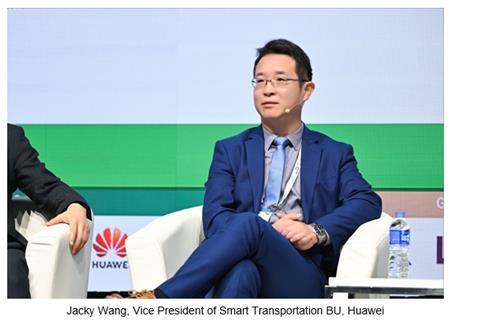As a world-leading ICT infrastructure and intelligent terminal provider, Huawei was invited to attend the opening ceremony of the Super Terminal Expo in Hong Kong, China, on 5 November, and speak at a panel. Huawei showcased its latest products and solutions at the exhibition, as well as its achievements in helping the aviation and logistics industries go digital and intelligent.

ICT infrastructure development is crucial to the digital and intelligent transformations of civil aviation. At the panel, Airport Hub Strategies and APAC Challenges, Jacky Wang, Vice President of Smart Transportation BU, Huawei, noted that the business scope of hub airports is expanding, and that passenger, freight, commercial, fund, and information flows are merging at a faster pace. According to Wang, Huawei is committed to creating a digital and intelligent foundation that features multi-dimensional sensing, ubiquitous connectivity, and an open platform, to help hub airports improve operational efficiency, passenger experiences, and airport security. “By harnessing Huawei’s AI capabilities, we hope to collaborate with industry customers and partners to develop more intelligent solutions. These solutions are expected to drive the intelligent transformation of hub airports and enhance the level of intelligence in the civil aviation sector,” he said.
Wang also highlighted that AI will be widely used to manage flight flows, airport security, and airports in general (Total Airport Management, or TAM), and that this will profoundly impact flight operation, passenger services, security, and other aspects of hub airports.
1. Flight operation
- Precise ETA and VTT prediction: With AI modeling, airports can accurately predict the estimated time of arrival (ETA) and variable taxi time (VTT). Having accurate data can reduce the wait times for support functions by up to five minutes and improve airport resource utilization.
- Flight milestone data collection: Airports can leverage AI and IoT technologies to automatically collect information from over 20 flight milestones, such as aircraft arrival and departure times from stands, and data about the opening and closing of cabin doors.
2. Passenger services
- Seamless travel experiences: One-ID technology can be applied to check-in, security checks, boarding, and other processes to improve the efficiency of travel for passengers and deliver a better travel experience.
- Shorter queue times: Algorithms can accurately calculate the number of passengers in queues and the average wait time with 98% accuracy. Timely alerts can then be generated, and measures can be taken to reduce passenger waiting times by 15%.
3. Security management
- Airport perimeter security with fibre sensing: Intelligent optical fiber sensing, which is based on large AI models, can resolve the pain points of traditional perimeter systems, like their high false alarm rates. It saves time on manual reviews and efficiently protects airport perimeters by achieving zero missed alarms and a very low false alarm rate of less than one false alarm/km/day.
4. TAM
- Airports can leverage digital twins and big data to build centralized airport operations control centers to comprehensively control flight, passenger, and freight flows, apron security, traffic situations, and more. These control centers would facilitate centralized command and dispatch, and make it easier to support operations based on just one map.
Going digital and intelligent has gradually become the core driving force behind the high-quality development of the civil aviation industry. To date, Huawei has already served over 210 airports, airlines, and air traffic management customers worldwide. Huawei will continue to increase its investment into the transportation sector and its exploration of suitable technologies for different civil aviation business scenarios. Huawei takes a proactive approach to problem solving, and carefully considers every part of each project, from determining the project requirements, R&D, and product engineering innovation, to testing and implementation. By collaborating with users and ecosystem partners, Huawei aims to create both innovative solutions and significant value for the civil aviation industry.
Using its expertise and experience in transportation hubs, transportation networks, passenger/freight flows, and the low-altitude system, Huawei has built a digital and intelligent foundation for comprehensive transportation and logistics, which will in turn enable secure and efficient operations throughout the supply and industry chains. Huawei has used AI to assist civil aviation customers in establishing efficient integrated operation systems and comprehensive security systems to upgrade security assurance and emergency handling capabilities. Huawei hopes that they will enable aviation hubs to improve the quality and efficiency of their operations and management, and to ultimately achieve high-quality development.
For more information about Huawei’s smart airport solutions, please visit: https://e.huawei.com/en/industries/aviation























